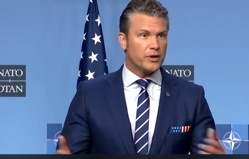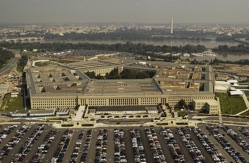Practical Security Measure or Infringement on Free Speech?: New Pentagon Policy for Reporters Receives Major Backlash
Sarah Holliday : Oct 15, 2025
The Washington Stand
"I do have a concern about the DOW taking this too far and infringing on First Amendment rights." However, "I don't see requiring them to sign this as being something that is necessarily going to inhibit their ability to report on news stories." -Lt. Gen. (Ret.) William G. Boykin
 [WashingtonStand.com] The Department of War (DOW), led by Secretary Pete Hegseth, is enforcing a new policy allegedly aimed at tightening security protocols within the Pentagon. News organizations covering the military now face a tight deadline—they must sign an official document by 5 p.m. on Tuesday to acknowledge these new measures. Notably, amid a chorus of condemnation from major outlets, only a single news organization has moved forward with signing it. The rest have refused. (Screengrab image: via Reuters)
[WashingtonStand.com] The Department of War (DOW), led by Secretary Pete Hegseth, is enforcing a new policy allegedly aimed at tightening security protocols within the Pentagon. News organizations covering the military now face a tight deadline—they must sign an official document by 5 p.m. on Tuesday to acknowledge these new measures. Notably, amid a chorus of condemnation from major outlets, only a single news organization has moved forward with signing it. The rest have refused. (Screengrab image: via Reuters)
At its core, the policy introduces two pivotal restrictions designed to safeguard sensitive operations. First, reporters will no longer be permitted to access restricted areas of the Pentagon without a mandatory official escort. Second, any journalist who attempts to ask about unreleased information—whether classified documents, strategic details, or other internal materials—from DOW personnel risks revocation of their access privileges, effectively barring them from entry. In response, multiple prominent news organizations have decried these changes as a direct assault on their constitutional protections.
Newsmax, for example, described the requirements as "unnecessary and onerous," while stating it hopes "the Pentagon will review the matter further." Echoing this sentiment, The New York Times issued this statement: "Since the policy was first announced, we have expressed concerns that it constrains how journalists can report on the US military, which is funded by nearly $1 trillion in taxpayer dollars annually. The public has a right to know how the government and military are operating. The Times is dedicated to pursuing the public interest through deep, fair reporting and an unwavering pursuit of the facts."
Similarly, The Atlantic voiced its vehement disapproval, declaring that it "fundamentally" opposes what it considers "restrictions that the Trump administration is imposing on journalists." Reuters insisted it's "bound by its commitment to accurate, impartial and independent news. We also steadfastly believe in the press protections afforded by the US Constitution, the unrestricted flow of information and journalism that serves the public interest without fear or favor. The Pentagon's new restrictions erode these fundamental values."
 Despite the resistance, Hegseth has doubled down, stating that any reporters or outlets who fail to formally acknowledge the policy in writing by the Tuesday cutoff must surrender their access badges and vacate their designated workspaces within the Pentagon by the subsequent day. (Image: Pixabay)
Despite the resistance, Hegseth has doubled down, stating that any reporters or outlets who fail to formally acknowledge the policy in writing by the Tuesday cutoff must surrender their access badges and vacate their designated workspaces within the Pentagon by the subsequent day. (Image: Pixabay)
Given the media landscape's bristling opposition, Chief Pentagon spokesman Sean Parnell sought to clear the air further. "The policy does not ask for them to agree," he emphasized, "just to acknowledge that they understand what our policy is. This has caused reporters to have a full blown meltdown, crying victim online. We stand by our policy because it's what's best for our troops and the national security of this country." And in another clarifying interaction, one user on X asked, "Is this [policy being implemented] because [reporters] can't roam the Pentagon freely? Do they believe they deserve unrestricted access to a highly classified military installation under the First Amendment?" Secretary Hegseth's reply was a simple, "Yes."
This latest standoff is hardly an isolated incident in the ongoing tensions between the press and the Trump administration. In February, President Donald Trump renamed the "Gulf of Mexico" to the "Gulf of America" through an executive order dubbed "Restoring Names That Honor American Greatness." In its aftermath, the White House barred an Associated Press reporter from Oval Office briefings after the journalist declined to incorporate the rebranding into their reporting.
Concerning this latest policy dispute, the reactions have been as diverse as they are impassioned. Lt. Gen. (Ret.) William G. Boykin, who serves as executive vice president of Family Research Council and is a 36-year veteran of the armed forces, told The Washington Stand, "Having spent the last four years of my active duty in the Pentagon, I can see the rational for what the DOW is trying to do with their new press rules." As he went on to explain, "In case they haven't kept up with what has happened periodically in the Pentagon, classified information has been passed to nefarious sources which is very damaging."
Boykin recounted his own experiences during his tenure, illustrating the policy's practical roots. As the General recalled, "In my time at the Pentagon, I had people from the media coming to me all the time wanting to talk to me. When I asked them if they had been cleared by the press secretary, the answer was generally, 'No.'" While validating the security imperatives, he tempered his endorsement with a nod to constitutional boundaries. "I do have a concern about the DOW taking this too far and infringing on First Amendment rights." However, he concluded, "I don't see requiring them to sign this as being something that is necessarily going to inhibit their ability to report on news stories." Subscribe for free to Breaking Christian News here
Sarah Holliday is a reporter at The Washington Stand.
